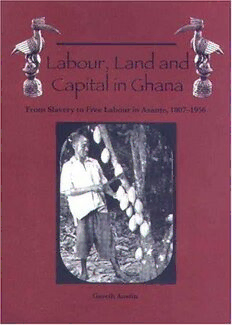
Labour, Land, and Capital in Ghana: From Slavery to Free Labour in Asante, 1807-1956 PDF
616 Pages·2005·2.531 MB·English
Most books are stored in the elastic cloud where traffic is expensive. For this reason, we have a limit on daily download.
Preview Labour, Land, and Capital in Ghana: From Slavery to Free Labour in Asante, 1807-1956
Description:
This is a study of the changing rules and relationships within which natural, human and man-made resources were mobilized for production during the development of an agricultural export economy in Asante, a major West African kingdom which became, by 1945, the biggest regional contributor to Ghana's status as the world's largest cocoa producer. The period 1807-1956 as a whole was distinguished in Asante history by relatively favorable political conditions for indigenous as well as (during colonial rule) for foreign private enterprise. It saw generally increasing external demands for products that could be produced on Asante land. This book, which fills a major gap in Asante economic history, transcends the traditional divide between studies of precolonial and of twentieth-century African history. It analyses the interaction of coercion and the market in the context of a rich but fragile natural environment, the central process being a transition from slavery and debt-bondage to hired labor and agricultural indebtedness. It contributes to the broad debate about Africa's historic combination of emerging 'capitalist' institutions and persistent 'precapitalist' ones, and tests the major theories of the political economy of institutional change. It is written accessibly for an inter-disciplinary readership.
See more
The list of books you might like
Most books are stored in the elastic cloud where traffic is expensive. For this reason, we have a limit on daily download.
